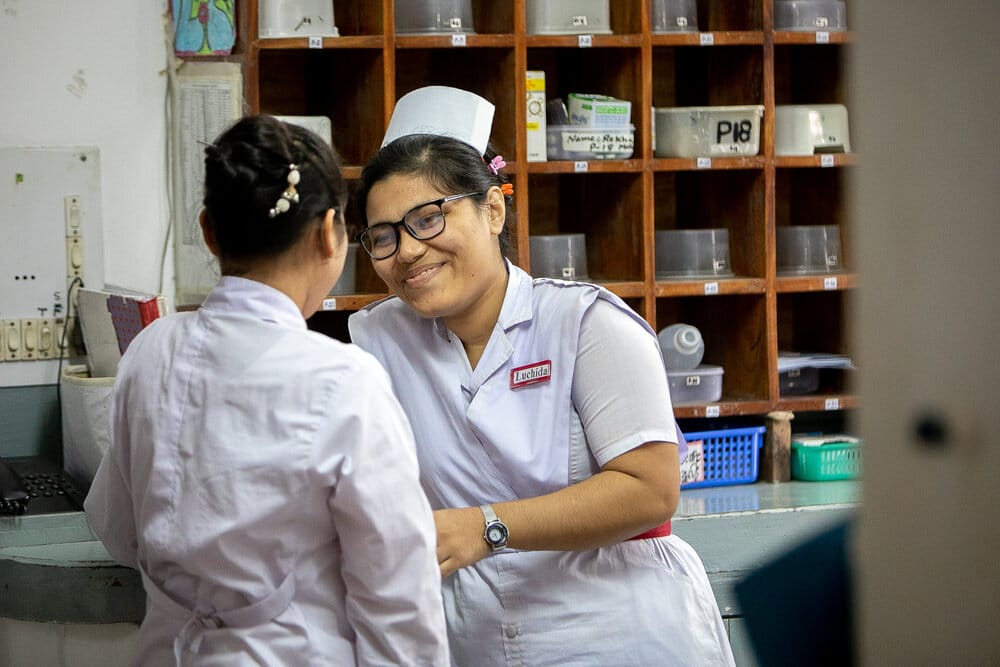
CCIH Small Grant Helps Hospital Strengthen Integration of Faith and Care
I have come that they may have life, and have it to the full. (John 10:10)
John 10:10 is the guiding scripture for LAMB, located in the Dinajpur District in Bangladesh. LAMB’s vision is for the people of Bangladesh to be transformed by the love of God and experience abundant life in healthy and just communities, and its mission is to serve God through serving the poor and underprivileged, especially women and children.
LAMB Hospital started as a small clinic at the site where the hospital is currently located, with mobile clinics in several surrounding villages in the 1970s. The Community Health division soon expanded to include sanitation programs, health teaching and literacy, and other preventive health and community development programs, with the hospital opening in 1983.
The hospital operated as a mission hospital under World Mission Prayer League as its parent agency for oversight until LAMB was restructured in 1996 into a non-governmental agency accountable to its own international board.
Today, a team of over 400 staff are committed to serve for the holistic health and well-being of more than 141,000 people in the working areas through community development and education projects. Every year, the hospital treats approximately 55,000 outpatients and 7,500 inpatients, and delivers 2,500 babies.
Strengthening Faith Identity and Inspiration
LAMB leadership identified a need to connect with the local Christian community and local churches and to deepen the spiritual connection of its staff to their work. Though LAMB has a clearly defined mission, vision, and values rooted in its Christian identity, staff seem to struggle understanding how they connect with this vision and reflect that identity through their work.
CCIH’s Christian Organizational Identity Assessment (COIA) tool was developed to help organizations such as the LAMB Hospital better understand how they reflect their faith identity in their operations.
Supported by a CCIH small grant, LAMB Hospital in Bangladesh completed the COIA and identified priority areas to address with key actions to strengthen the integration of faith and health and a reflection of its Christian identity in its programs.

Above Photo: LAMB staff in an organizational values session
Assessment Turns to Action
After conducting the assessment and evaluating spiritual development activities of all departments, LAMB leadership identified gaps and areas to improve. The team decided to hold seminars for new staff to orient them to LAMB’s mission, vision, and values, with values refresher seminars reaching over 81% of the current staff. An art competition was launched to encourage staff to reflect on LAMB’s mission, vision, and values in a creative and inspiring way.
LAMB focused on prayer, with its Spiritual Development Committee (shown below) organizing morning devotions and opportunities for staff to share testimonies to promote spiritual growth across all departments.

The team also developed a promotional video for Theological Education by Extension (TEE) courses to encourage more Christian staff to start the theology education opportunities offered by the College of Christian Theology Bangladesh. The TEE courses, which range from certificate to master’s level, can be completed over three to five years at the student’s own pace. The TEE graduates are encouraged to volunteer as tutors in their communities. Seven TEE graduates at LAMB teach diploma and certificate courses.
TEE education leads to increased confidence in sharing God’s Word and His Truth with others in the organization and leading devotions in departments. The TEE students or graduates are actively participating in local church activities and leading Sunday school classes, women’s groups, and family prayers.
Connecting with Community and Churches
LAMB’s Church and Community Transformation (CCT) project works with 42 local churches of different denominations in the Nawabganj subdistrict of the Dinajpur District. The project established and nurtured 42 bible study groups in seven interchurch networks.
CCT aims to strengthen churches to demonstrate God’s love to their local communities and also boost their own socio-economic resilience. Project activities focus on capacity building, community mobilization, and advocacy with government and non-government organizations to enhance access to essential services and livelihood opportunities.
To inform and influence local church pastors and their leaders about health issues in the area LAMB serves, the team held a seminar for local churches in October 2024, in conjunction with World Palliative Care Day. Nineteen pastors and church leaders participated, learning about palliative care and receiving a prayer guide they can use during church services. The pastors expressed their gratitude for the event and their enthusiasm for leading prayers for individuals suffering from terminal illnesses and chronic diseases.

Pastor Basudeb Sarker from the Talithakumi Church (shown above at his home church) shared, “In the church and within families, people with terminal illnesses endure very difficult experiences. They not only suffer from pain and physical troubles but are often neglected by their families and the community, leading them to lose hope. I shared this message with my congregation, reminding them of God’s love and His control over every life. I also organized prayer sessions with my congregation to pray for patients, their families, and those who care for them. I am honored to be part of LAMB’s Palliative Care initiative.”
